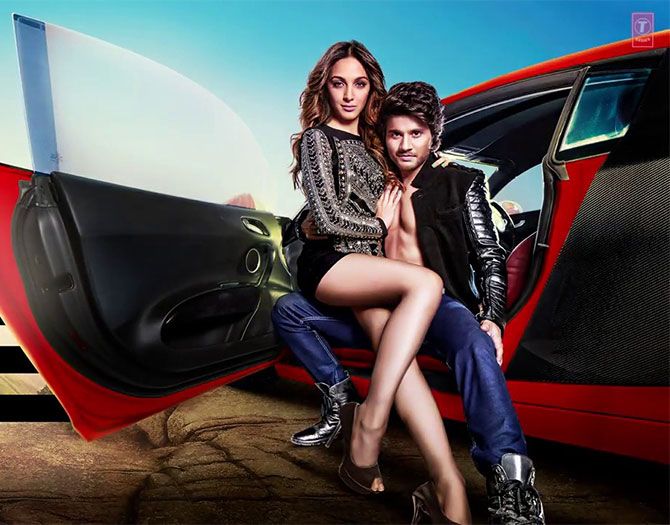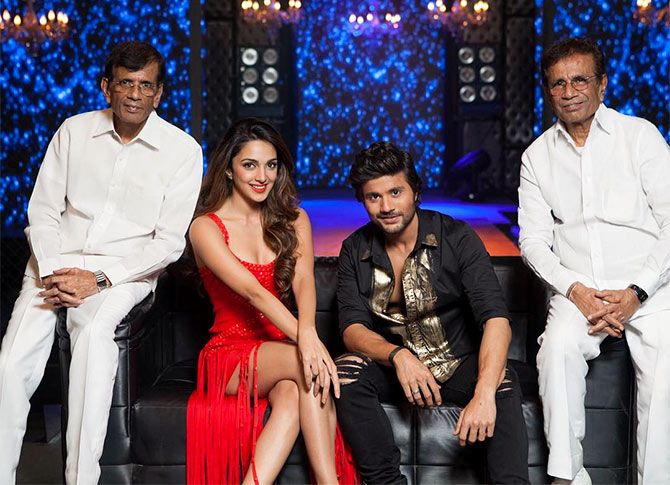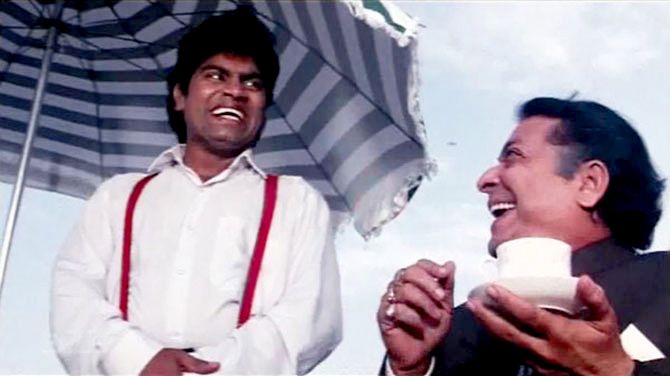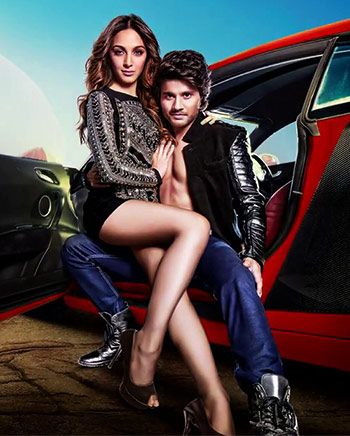'We believe in the people of our country. No matter how modern they become, they will not forget their culture and emotions. If you write about the emotions and culture, people will like it and relate to it.'
Abbas-Mustan return with Machine.

Brothers Abbas and Mustan Burmawalla haven't stayed apart since the time they were born -- they don't even want to know how it would feel to spend a day away from each other!
Yes, Abbas-Mustan are inseparable.
"We have never even thought about it," Mustan says. "Since the time we were born, since we have started understanding things, we have been together. The thought of separation hasn’t crossed our minds. We can't stay apart."
They have the same favourites where directors and actors are concerned.
They dress alike, always wearing white.
"We like brightness, gloss and we like it simple. This reflects in our films also," Mustan says, explaining why they love to wear white. "You will hardly see any night scenes in our films."
Abbas is the quieter one and lets his brother do most of the talking.
The brothers tell Jahnavi Patel/ Rediff.com what their new film Machine is all about, in which they launch Abbas' son Mustafa.
Is there pressure on you to show Mustafa in the best light in Machine?
Mustan: Yes, of course. Whenever our films release, there is pressure, nervousness and excitement.
In this film too, there is pressure and nervousness -- as an uncle for me and as a dad for Abbas.
We are keeping our fingers crossed.
Kiara Advani, who co-stars in the film, mentioned that she was more pampered on the sets than Mustafa.
Mustan: Whichever film we do, the girls are always special for us. In this film too, Kiara is special for us.
Mustafa is our kid, he is also young... we pamper all the actors.
Kiara is a very good-natured, hard working girl.
Abbas: We concentrated on Kiara and the other actors just as much as we did on Mustafa.
Kiara has a very important role in this film. She has performed well. She has a good grasping power.
Mustafa and Kiara’s chemistry looks good in the film.

What is Machine about? The trailer reminds us of Baazigar.
Mustan: Baazigar was a different story. It was a revenge film.
This is also a thriller but it's a romantic thriller.
The caption of our film is 'Heart is the only machine that feels'. So it is all about love. There are a lot of twists and turns, racing and everything. Both the characters have multi-layered shades. People will know the reason behind the title Machine in the last 20 minutes of the film.
Machine is not about a robot or something. Our heart is also a machine.
Why did you think of recreating old hit songs like Ek Chatur Naar and Tu Cheez Badi Hai Mast Mast?
Abbas: We love the song Tu Cheez Badi Hai Mast Mast, it's our favourite. We didn’t want to put this song in the promotions; we put it in a situation.
We took Chatur Naar because we loved the words 'chatur naar'. We have just taken the words, we haven’t recreated the song. We used the words and made a fast-paced dance number.
There's always a twist in the Abbas-Mustan movies.
Mustan: There is pressure to deliver something and get something new every time.
After the story gets finalised, it flows normally like a, b, c, d, e...
Then, we work on the screenplay. That's when we decide where the film should start, maybe from m, n, o, p...
This keeps the audience guessing as to what will happen next. People are expecting p, q, r... but that doesn’t happen. The story jumps to d, e, f...
This makes the film's screenplay very interesting to watch.
Abbas: The thought of the script is the same but how to write a screenplay with a twist so that it becomes the best is what we look forward to. The audience also enjoys that.
Mustan: When there is a thriller, we expect people to use their mind, (so we) play with the mind of the audience.
This film is also like that.
People always say that action in Bollywood is over-the-top and not realistic. Your comments.
Mustan: We can’t match Hollywood action-wise because their budget is more. We shoot only how much the film requires.
This film is a thriller and there are a couple of car races, a Formula 1 race, and another car race. It's blended in the script, we haven't forcefully placed them in the film.
Both (Kiara and Mustafa) play racers and the story is based on them and how their love story unfolds. But action should not be compared to international because the people, who watch the film are Indians.
We have made the film for India.
Who is your favourite director?
Abbas: Our favourite director is Vijay Anand saab, who has made Jewel Thief and Teesri Manzil. He has been our inspiration. We have watched Teesri Manzil 10 times. We even liked Johny Mera Naam.
We like thrillers a lot. We would get lost in the theatre for two and a half-three hours.

Tell us about your best shooting experiences.
Mustan: There are so many stories...
We have worked with Johnny bhai (Johnny Lever) in Khiladi, Baazigar... His characters were inspired from real life people.
Like Babulal in Baazigar, the absent-minded character, who forgets things, we had seen someone like this in real life. We took that character and blended it with the story in the film.
Abbas: The audience had liked the character a lot.
Mustan: In Machine, we have shot a formula car race. We had shot that in Baazigar too, 23-24 years ago. The cars were similar but today, the technology is different. At that time, we took two days to shoot and to shoot this we took seven days.
We have used multiple cameras here. Technology wise, it was difficult to shoot, to teach the actors to drive the formula cars. It isn’t easy.
Abbas: To sit in the car is very difficult.
When we see the race, we feel it is comfortable but when we made Kiara and Mustafa sit inside, they looked uncomfortable. We made them practice for a week.
Over the years, filmmaking has undergone drastic changes.
Mustan: From that time to now, filmmaking is becoming different because technology changes. You keep yourself updated with the generation you are working with. We keep ourselves updated according to the requirements of the youth today. We try to match the technology.
Everything is changing but there is one thing -- we believe in the people of our country. No matter how modern they become, they will not forget their culture and emotions. If you write about the emotions and culture, people will like it and relate to it.
Abbas: We were shooting in Georgia for around 60 days. The actors used to call their parents and relatives. Why did they do that? These emotions are there in India only.
Mustan: Abroad, when kids turn 16 or 17, they leave the parents' house. Here, we are always connected to parents. No matter how modern the youth becomes, they stay with the family. There is attachment.
Abbas: We have been to a lot of foreign countries. We meet a lot of Indians there and they get so happy seeing us. They say, 'You have come from India. How does it feel there? The marriages are grand there.'
They stay there and watch (Indian) films so that they feel at home.
Mustan: They want to watch the culture in India. They youth of India is becoming westernised but the people in the West are more attached to the Hindustani culture.











